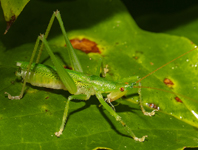Abstract
In a phylogenetic study of the insect order Strepsiptera, the peculiar paleotropical genus Lychnocolax Bohart, 1951 was recovered as the sister group to Stylopidae + Xenidae rather than as nested among the Myrmecolacidae (McMahon et al., 2011). Accordingly, the genus was removed from the myrmecolacids and placed in a family of its own (Kathirithamby & Engel, 2014). Kathirithamby & Engel (2014) erroneously attributed the family-group name to Bohart (1951) and therefore provided nothing more than diagnostic traits in the form of a dichotomous key to families. Cook (2019) rightly noted that Bohart (1951) provided only an account of the genus but retained it within Myrmecolacidae and did not establish a higher category for Lychnocolax. Accordingly, the first usage of a family-group name based on Lychnocolax was by Kathirithamby & Engel (2014) (Cook, 2019). Unfortunately, their usage of the name does not meet the criteria required to make the name available from that date and source (ICZN, 1999). Specifically, after 1999 all new family-group names, aside from being based on an available type genus and accompanied by a description in words (ICZN, 1999: Arts. 13.1 and 13.2), must also meet the following criteria pertinent to the current case : 1) must be explicitly indicated as new (Art. 16.1), and 2) must be accompanied by a clear citation of the type genus (Art. 16.2). While Kathirithamby & Engel (2014) did base the name on an available type genus and included diagnostic characters to differentiate the family from other groups, they did not explicitly indicate the name as new (since they erroneously attributed the name to Bohart), nor did they specifically note the type genus (even if it was apparent from the formation of the familial name). Thus, given the failure to satisfy Articles 16.1 and 16.2 (ICZN, 1999), the family-group name based on Lychnocholax Bohart, 1951 must be considered as unavailable from the publication of Kathirithamby & Engel (2014). Although the family name has been mentioned a few times subsequently (e.g., Lu & Liu, 2014; Kathirithamby et al., 2015; Engel et al., 2016; Kathirithamby, 2018; Cook, 2019), none of these latter uses satisfy the requirements of the ICZN (1999). Therefore, this nomenclatural oversight is here corrected utilizing the diagnostic traits outlined in the key of Kathirithamby & Engel (2014).
References
Bohart, R.M. (1951) The Myrmecolacidae of the Philippines (Strepsiptera). Wasmann Journal of Biology, 9 (1), 83–103.
Cook, J.L. (2019) Annotated catalog of the order Strepsiptera of the world. Transactions of the American Entomological Society, 145 (2), 121–267.
https://doi.org/10.3157/061.145.0202
Engel, M.S., Huang, D.-Y., Breitkreuz, L.C.V., Azar, D., Cai, C.-Y. & Alvarado, M. (2016) A new twisted-wing parasitoid from mid-Cretaceous amber of Myanmar (Strepsiptera). Cretaceous Research, 58, 160–167.
https://doi.org/10.1016/j.cretres.2015.10.008
ICZN (1999) International Code of Zoological Nomenclature. 4th Edition. International Trust for Zoological Nomenclature, London, xxix + 306 pp.
Kathirithamby, J. (2018) Biodiversity of Strepsiptera. In: Foottit, R.G. & Adler, P.H. (Eds.), Insect Biodiversity: Science and Society. Vol. II. Wiley-Blackwell, New Jersey, pp. 673–703.
https://doi.org/10.1002/9781118945582.ch22
Kathirithamby, J. & Engel, M.S. (2014) A revised key to the living and fossil families of Strepsiptera, with the description of a new family, Cretostylopidae. Journal of the Kansas Entomological Society, 87 (4), 385–388.
https://doi.org/10.2317/JKES140407.1
Kathirithamby, J., Delgado, J.A. & Collantes, F. (2015) Order Strepsiptera. Revista IDE@ [Ibero Diversidad Entomolόgica @ccesible], 62B, 1–11.
Lu, X. & Liu, X.-Y. (2014) Discovery of the twisted-wing parasite family Myrmecolacidae (Insecta: Strepsiptera) from China, with description of two new species of the genus Myrmecolax Westwood, 1861. Zootaxa, 3881 (4), 385–395.
https://doi.org/10.11646/zootaxa.3881.4.6
McMahon, D.P., Hayward, A. & Kathirithamby, J. (2011) The first molecular phylogeny of Strepsiptera (Insecta) reveals an early burst of molecular evolution correlated with the transition to endoparasitism. PLoS ONE, 6 (6), e21206.
https://doi.org/10.1371/journal.pone.0021206

